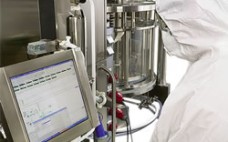Single-use technology began on the downstream side of bioprocessing, primarily in presterilized filter capsules and plastic biocontainers for buffers and media. Since then, it has expanded to upstream operations, including disposable bioreactors and mixers. The newest trend is to move further downstream into sterile formulation and filling. With the increasing popularity of disposable systems, some users are wondering what is being done to standardize the various components from different manufacturers and what BPSA (the Bio-Process Systems Alliance) is doing to…
Manufacturing
Technology Transfer of CMC Activities for MAb Manufacturing
With combined 2009 revenues estimated to be over US$40 billion, monoclonal antibody (MAb) products have become the dominant component of the biopharmaceutical market (1). Continued interest and development of this exciting class of products will drive the overall sales of biopharmaceutical products in the future, making them the fastest growing segment of the overall pharmaceutical market (2). To help companies developing MAb products, BioProcess Technology Consultants recently published a comprehensive report outlining the complex technical, regulatory, and strategic…
Technology Transfer of CMC Activities for MAb Manufacturing
As monoclonal antibody products succeed and advance through development, their manufacturing requirements change. The probability of a smooth and successful technology transfer process depends on several factors. Sending and receiving parties must be well aligned in expectations, which can be facilitated by early and detailed planning and communications.
To help companies developing MAb products, BioProcess Technology Consultants recently published a comprehensive report outlining the complex technical, regulatory and strategic chemistry, manufacturing and control (CMC) activities necessary to successfully advance new MAbs from discovery to first-in-human clinical trials and the market as quickly and economically as possible. Read this informative white paper to learn more.
A Smarter Approach to Biomanufacturing
Mergers and acquisitions have long been a staple of the life sciences industry — a reality that has resulted in disparate information technology (IT) environments within and across often far-flung enterprises. The situation is particularly prevalent in manufacturing operations because a pharmaceutical or biotechnology organization may run different management systems in nearly every separate facility (especially when contract manufacturers are involved). These “siloed” information environments are hindering efforts to evaluate and improve quality and operational efficiency at a…
Contractee Responsibilities in Outsourced Pharmaceutical Quality Control Testing
Certain types of quality control (QC) testing are often outsourced by pharmaceutical companies, regardless of an organization’s size — typically because the company is either incapable of performing the assays in-house or does not wish to bring them into its facility. The decision to outsource may be based on the complexity of techniques involved special skills required for conducting the assays a need for biohazardous reagents such as radioisotopes limited testing frequency for the assays or (in biologics…
Flexible Manufacturing
Flexibility has quickly become one of the most noticeable buzzwords of the bioprocessing industry. Understanding what constitutes a “flexible” process ranges from the simple application of one specific type of technology (e.g., single-use systems, automation, standard controls) to a somewhat extreme concept of a “throw-away” process. But whatever the definition, the factors leading to the need for more flexible approaches to biomanufacture are clear: Rapid, sometimes unexpected, changes in a company’s business situation and/or product portfolio (whether for patients or…
The Collaborative Future: A Case Study
In our February 2010 special report, “The Time Has Come for Automation in Bioprocessing,” one theme that made itself clear was the need for vendors, biopharmaceutical companies, and sometimes even regulators to work together toward the goal of better, faster, and cheaper product development through (among other things) automation technologies. Martin Rhiel of Novaris cell and process R&D told us, “It would be really nice to just buy it and implement it, but this doesn’t always work…Nowadays, the…
The Game Changer
Single-use technologies are coming of age and joining other driving forces to reshape the landscape of biopharmaceutical industry. This innovation has created new platforms for bioprocessing, offering competitive advantages and tremendous opportunities to current biomanufacturers. Moreover, the increasing acceptance of disposable systems with proven success will help enable niche products and bring emergent players to the market. The Age of Stainless Steel The discovery of DNA structure in the middle of the 20th century led to numerous breakthroughs in biological…
Road Map to Implementation of Single-Use Systems
The Bio-Process Systems Alliance (BPSA) is an organization of equipment suppliers, service providers, and users in the biopharmaceutical industry whose shared mission is to facilitate implementation of single-use technologies in biomanufacturing processes. A key focus of BPSA’s core activities is to educate users and develop guides that help safeguard the quality of drugs and therapies produced with single-use process technologies. As an extension of its technical guides and white papers, BPSA realized the importance of developing…
Using Disposables in Cell-Culture–Based Vaccine Production
A recent private grant of US$10 billion for human vaccine applications illustrates the revival of interest in vaccine science (1). The 2009 response by vaccine manufacturers to the H1N1 pandemic revealed the convergence of three technological developments. First is a revolution in technology: Vaccines are being developed for diverse and unprecedented applications through a number of entirely new approaches. Second is the recent adoption of cultured cell-based production for a growing number of vaccines, such as influenza. And…

